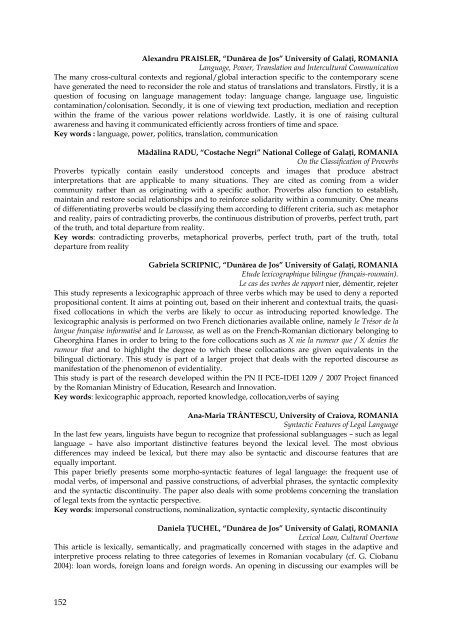Vol. 5/2009 - Facultatea de Litere
Vol. 5/2009 - Facultatea de Litere
Vol. 5/2009 - Facultatea de Litere
Create successful ePaper yourself
Turn your PDF publications into a flip-book with our unique Google optimized e-Paper software.
Alexandru PRAISLER, “Dunărea <strong>de</strong> Jos” University of Galaţi, ROMANIA<br />
Language, Power, Translation and Intercultural Communication<br />
The many cross-cultural contexts and regional/global interaction specific to the contemporary scene<br />
have generated the need to reconsi<strong>de</strong>r the role and status of translations and translators. Firstly, it is a<br />
question of focusing on language management today: language change, language use, linguistic<br />
contamination/colonisation. Secondly, it is one of viewing text production, mediation and reception<br />
within the frame of the various power relations worldwi<strong>de</strong>. Lastly, it is one of raising cultural<br />
awareness and having it communicated efficiently across frontiers of time and space.<br />
Key words : language, power, politics, translation, communication<br />
Mădălina RADU, “Costache Negri” National College of Galaţi, ROMANIA<br />
On the Classification of Proverbs<br />
Proverbs typically contain easily un<strong>de</strong>rstood concepts and images that produce abstract<br />
interpretations that are applicable to many situations. They are cited as coming from a wi<strong>de</strong>r<br />
community rather than as originating with a specific author. Proverbs also function to establish,<br />
maintain and restore social relationships and to reinforce solidarity within a community. One means<br />
of differentiating proverbs would be classifying them according to different criteria, such as: metaphor<br />
and reality, pairs of contradicting proverbs, the continuous distribution of proverbs, perfect truth, part<br />
of the truth, and total <strong>de</strong>parture from reality.<br />
Key words: contradicting proverbs, metaphorical proverbs, perfect truth, part of the truth, total<br />
<strong>de</strong>parture from reality<br />
Gabriela SCRIPNIC, “Dunărea <strong>de</strong> Jos” University of Galaţi, ROMANIA<br />
Etu<strong>de</strong> lexicographique bilingue (français-roumain).<br />
Le cas <strong>de</strong>s verbes <strong>de</strong> rapport nier, démentir, rejeter<br />
This study represents a lexicographic approach of three verbs which may be used to <strong>de</strong>ny a reported<br />
propositional content. It aims at pointing out, based on their inherent and contextual traits, the quasifixed<br />
collocations in which the verbs are likely to occur as introducing reported knowledge. The<br />
lexicographic analysis is performed on two French dictionaries available online, namely le Trésor <strong>de</strong> la<br />
langue française informatisé and le Larousse, as well as on the French-Romanian dictionary belonging to<br />
Gheorghina Hanes in or<strong>de</strong>r to bring to the fore collocations such as X nie la rumeur que / X <strong>de</strong>nies the<br />
rumour that and to highlight the <strong>de</strong>gree to which these collocations are given equivalents in the<br />
bilingual dictionary. This study is part of a larger project that <strong>de</strong>als with the reported discourse as<br />
manifestation of the phenomenon of evi<strong>de</strong>ntiality.<br />
This study is part of the research <strong>de</strong>veloped within the PN II PCE–IDEI 1209 / 2007 Project financed<br />
by the Romanian Ministry of Education, Research and Innovation.<br />
Key words: lexicographic approach, reported knowledge, collocation,verbs of saying<br />
Ana-Maria TRÂNTESCU, University of Craiova, ROMANIA<br />
Syntactic Features of Legal Language<br />
In the last few years, linguists have begun to recognize that professional sublanguages – such as legal<br />
language – have also important distinctive features beyond the lexical level. The most obvious<br />
differences may in<strong>de</strong>ed be lexical, but there may also be syntactic and discourse features that are<br />
equally important.<br />
This paper briefly presents some morpho-syntactic features of legal language: the frequent use of<br />
modal verbs, of impersonal and passive constructions, of adverbial phrases, the syntactic complexity<br />
and the syntactic discontinuity. The paper also <strong>de</strong>als with some problems concerning the translation<br />
of legal texts from the syntactic perspective.<br />
Key words: impersonal constructions, nominalization, syntactic complexity, syntactic discontinuity<br />
Daniela ŢUCHEL, “Dunărea <strong>de</strong> Jos” University of Galaţi, ROMANIA<br />
Lexical Loan, Cultural Overtone<br />
This article is lexically, semantically, and pragmatically concerned with stages in the adaptive and<br />
interpretive process relating to three categories of lexemes in Romanian vocabulary (cf. G. Ciobanu<br />
2004): loan words, foreign loans and foreign words. An opening in discussing our examples will be<br />
152












